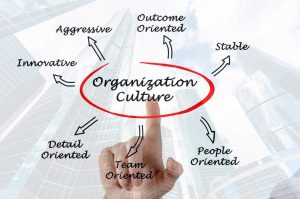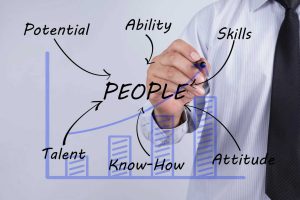
Editor: Dhania Puspa Purbasari
In an increasingly competitive and dynamic business environment, competitive advantage is essential for any organization that wants to survive and thrive. One of the most valuable assets that can provide this advantage is human capital, which encompasses the knowledge, skills, and competencies of employees that play a critical role in determining the performance and success of an organization. On the other hand, organizational culture plays a crucial role in influencing the effectiveness and development of human capital. Organizational culture not only determines how employees interact and work but also shapes the values and beliefs that underlie their behavior. This article will delve into the influence of organizational culture on human capital and how companies can build and maintain a supportive culture to achieve their strategic goals.
What is Organizational Culture?

Organizational culture is a system of values, beliefs, norms, and practices adopted by members of an organization. This culture reflects how members of the organization think and behave in various situations. Organizational culture is not something visible physically but rather the ‘soul’ of the organization that shapes behavior, attitudes, and interactions among members. The main components of organizational culture include:
- Values and Beliefs: Fundamental principles deemed important and adopted by the organization. These values and beliefs often form the foundation for every decision and action taken by the organization.
- Norms: Unwritten rules that govern the behavior of organizational members. These norms help create expectations about how members should behave and interact with one another.
- Rituals and Symbols: Actions or symbols that reflect the organization’s culture, such as ceremonies, celebrations, or the use of specific symbols that have special meaning for the organization.
- Stories and Myths: Narratives that reflect the organization’s values and history. These stories and myths are often used to convey moral messages, inspire members, and reinforce the organization’s identity.
The Influence of Organizational Culture on Human Capital

A strong organizational culture can shape employee identity and increase their loyalty. When employees feel connected to the organization’s values and beliefs, they are more likely to feel attached and committed to the organization. This strong identity not only helps retain employees but also motivates them to contribute their best to the organization. Moreover, high loyalty can reduce employee turnover, thereby reducing the costs of recruitment and training of new employees.
A culture that supports learning and innovation significantly aids in the development of employee skills and knowledge. For example, organizations with a learning culture usually provide continuous training programs, access to educational resources, and opportunities for self-development. In such a supportive environment, employees are motivated to keep learning and improving their competencies, ultimately enhancing individual and organizational performance.
An organizational culture that emphasizes collaboration and open communication can enhance employee performance and productivity. In such a culture, employees feel heard and valued, encouraging them to contribute more actively and innovate. Good collaboration also facilitates the exchange of ideas and knowledge, leading to creative solutions to the problems faced by the organization. Furthermore, open communication helps prevent misunderstandings and conflicts that can disrupt work productivity.
An adaptable organizational culture makes it easier for employees to adjust to changes. In a rapidly changing business world, the ability to adapt is crucial. Employees working in a culture that supports adaptability are better prepared to face new challenges and innovate. They are also more open to change, helping the organization remain relevant and competitive in the face of market and technological changes.
Real-World Examples
Several well-known companies have successfully built strong and supportive organizational cultures, thereby enhancing their human capital. Two such companies are Google and Zappos.

Google is known for its organizational culture that supports creativity and innovation. The company provides a flexible and inspiring work environment that encourages employees to think outside the box and develop new ideas. Google also offers various facilities and training programs to help employees develop their skills. As a result, Google has successfully attracted and retained top talent in the technology industry, producing numerous innovations that have transformed the way we live and work.
Zappos

Zappos is another example of a company with a successful organizational culture. The company emphasizes customer service and employee happiness as its core values. Zappos believes that happy employees will provide better service to customers. To support this culture, Zappos provides various wellness and self-development programs for its employees. Consequently, Zappos has high customer satisfaction and employee loyalty, contributing to the company’s long-term success.
Strategies for Building an Organizational Culture that Supports Human Capital

To build an organizational culture that supports the development of human capital, companies need to implement several strategic steps. Here are some strategies that can be applied:
- Inspirational and Exemplary Leadership
Organizational leaders play a crucial role in shaping and maintaining the organizational culture. Inspirational and exemplary leaders can influence employees to adopt desired values and behaviors. Leaders must commit to promoting a positive and supportive culture and provide the necessary support for employees to grow.
- Effective and Open Communication
Effective and open communication is essential in building a strong organizational culture. Organizations should create communication channels that allow for the free exchange of ideas and feedback. Employees should feel comfortable expressing their opinions and ideas without fear of negative consequences. Good communication also helps build trust and strong relationships between employees and management.
- Continuous Training and Development Programs
To support the development of human capital, organizations must provide continuous training and development programs. These programs should be designed to meet employees’ needs and help them develop skills relevant to the organization’s goals. Additionally, organizations should offer opportunities for employees to grow and reach their full potential.
- Supportive and Inclusive Work Environment
Creating a supportive and inclusive work environment is key to building a positive organizational culture. Organizations must ensure that all employees feel valued and recognized, regardless of their background, gender, or position. An inclusive work environment can increase employee engagement and motivation and encourage collaboration and innovation.
- Recognition and Rewards for Performance
Providing recognition and rewards for employee performance is an effective way to reinforce a supportive organizational culture. Employees who feel appreciated and recognized are more motivated to work hard and contribute more. Organizations should develop a fair and transparent recognition and reward system that appreciates employees for their contributions.
As a company engaged in training and personal development, Qando Qoaching plays an important role in helping organizations build a culture that supports the development of human capital. We offer various training programs designed to help employees develop their skills and knowledge. Additionally, we provide consulting services to help organizations identify and address challenges in building a positive and supportive culture.
We are committed to delivering measurable and tangible results for your organization. We use various tools and evaluation methods to measure the effectiveness of our training programs and ensure that they positively impact employee and organizational performance.
Organizational culture plays a crucial role in the development of human capital. By building a positive and supportive culture, organizations can enhance their performance and competitiveness. Organizational leaders must actively shape and maintain a culture that aligns with the company’s goals and values. Investing in a strong organizational culture not only benefits employees but also enhances the overall success and sustainability of the organization.
At Qando Qoaching, we are committed to helping your organization build a strong culture that supports the development of human capital. With our training programs and consulting services, we are ready to support you in achieving your strategic goals. Visit our website at https://campsite.bio/QQ Group for more information about our services and how we can help your organization. Don’t forget to follow our social media for the latest tips and updates on personal and professional development.
Mari bersama kita melangkah menuju Indonesia hebat!
